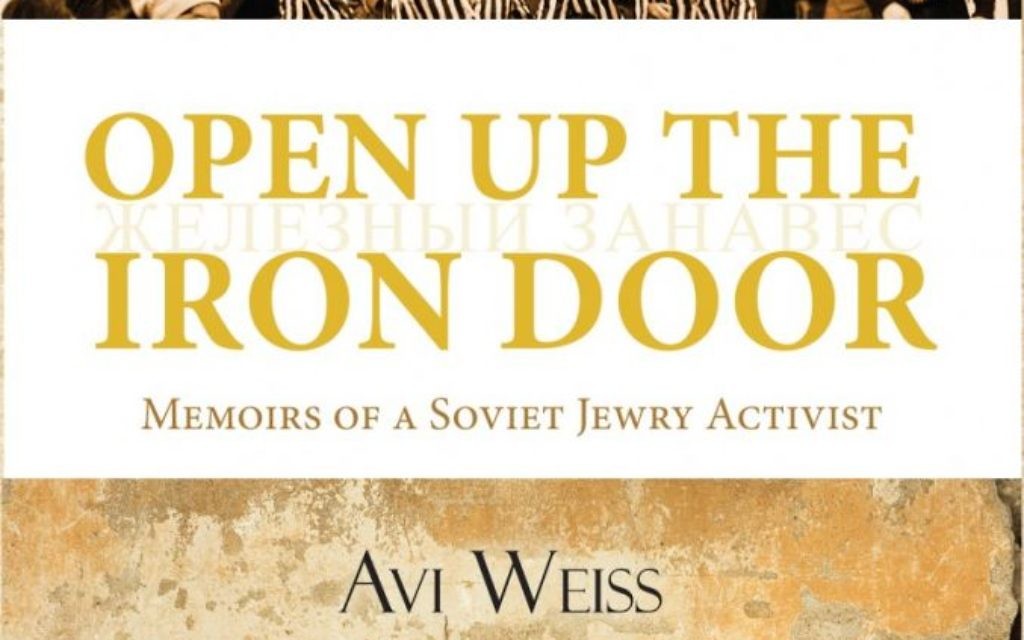Liberating Soviet Jewry’s Humble Heroes
Rabbi Avi Weiss can’t stop bucking the establishment.
The voice of Open Orthodoxy has waged his most recent battles against Modern Orthodoxy’s Rabbinical Council of America over the ordination of women and the acceptance of men ordained at the seminary he founded, Yeshivat Chovevei Torah.
But in his new book, “Open Up the Iron Door,” which he will discuss at the Book Festival of the Marcus Jewish Community Center, Rabbi Weiss is looking back at the quarter-century when American Jews took to the streets to demand that the Soviet Union let our people go.
Get The AJT Newsletter by email and never miss our top stories Free Sign Up
Rabbi Weiss was on the front lines of that movement from the late 1960s on, and he said that after the publication of Gal Beckerman’s “When They Come for Us, We’ll Be Gone,” which tells the story from the establishment perspective, he felt the need to provide the view from outside the mainstream.
Rabbi Weiss spoke briefly to the AJT by phone.
AJT: Why did you choose to write this book now?
Weiss: I’m getting older, and I thought that as I traveled the country, I recognized that perhaps the most important movement post-Shoah, aside from the establishment of the state of Israel, which is more than a movement, was the Soviet Jewry movement. And there are people in America who did not live through the movement who don’t know the story. People have all kinds of heroes, and there are heroes in the Soviet Jewry movement: the Soviet Jews themselves and their junior partners here in America who really contributed to doing the impossible, and that is the freeing of Soviet Jews and making a contribution to the bringing down of the Soviet Union. …
The book is peppered with principles of what I call spiritual activism, and it talks about how it’s most often the case that movements are started by people who work outside the establishment. Leadership is change, and it’s hard to really think about change from the inside because of bureaucracy and red tape.
AJT: Does there always have to be that tension between activists and the establishment?
Weiss: There doesn’t have to be tension, but the book talks about tension that did exist during the Soviet Jewry movement. There was unity in the ultimate goal, and that was the freedom of Soviet Jews. However, the tactics and the approach, even after the establishment created a national conference, were very, very different. …
The real heroes were the Soviet Jews themselves. Those in the West played a junior partner role. Although it’s a memoir about my experiences, I hope it comes across that it’s not about me. This is a memoir about humble heroes, I think, in the many hundreds of thousands throughout the world who stood with placards, who lobbied Congress, who visited the Soviet Union, who sang the freedom songs, who held freedom seders, who left empty chairs for Soviet prisoners of Zion. … I hope when people read it, that it inspires them to get involved and remain involved in the causes that are dear to us.
AJT: Why was this an issue that people latched onto?
Weiss: The Soviet Jewry movement started as a never-again movement — that the mistakes and the silence of the ’30s and ’40s we were not going to repeat. And I think we were very much influenced by the black civil rights movement, which enormously touched my soul, still does. And then there were great individuals like Glenn Richter, to whom the book is dedicated. He’s unknown to many people, but I consider him to be one of the greatest activists, if not the greatest, of the latter part of the 20th century, certainly in America. And I think all that came together, and the movement converged, a very powerful movement.
AJT: Do you see any comparable movements today?
Weiss: I think that the key cause that people can become involved in is the rampant anti-Semitism in the guise of anti-Israelism throughout the world, and I would say that an equally important spiritual activism cause is for Jews to become involved in a spiritual quest and seeking meaning and spirituality and greater Jewishness in their lives. Contrary to the Pew Reports and all of that, I really believe that people are searching, searching for G-d and for meaning.







comments